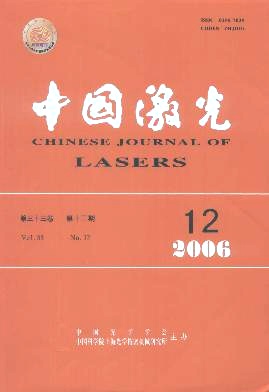中国激光, 2006, 33 (12): 1684, 网络出版: 2006-12-30
脉冲能量对激光推进中冲量耦合系数的影响
Effects of Laser Pulse Energy on Coupling Coefficient of Laser Propulsion
激光技术 激光推进 激光脉冲能量 冲量耦合系数 laser technique laser propulsion laser pulse energy momentum coupling coefficient
摘要
实验通过采用最大输出脉冲能量为100 J的TEA CO2激光器,研究了从13~80 J的激光脉冲能量对大气呼吸模式激光推进冲量耦合系数的影响。结果表明当脉冲能量在80~24 J变化时,冲量耦合系数没有明显变化,当脉冲能量下降至22 J以下时,冲量耦合系数下降52%。对这一特性进行了初步的理论分析,并通过改变实验环境气体压强,对这一理论进行了验证。
Abstract
A 100 J TEA CO2 laser was employed to study the effects of variety of pulse energy from 13 J to 80 J on the momentum coefficient for air-breathing mode. The results indicated that the momentum coupling coefficient (Cm) had no obvious change when the pulse energy decreased from 80 J to 24 J. While the energy was under 22 J, the Cm declined 52%. A preliminary analysis of theory was given, and an experiment of changing the air pressure in the vacuum chamber was carried to verify that.
郑义军, 谭荣清, 柯常军, 石海霞, 张阔海, 王东蕾, 刘世明, 吴谨, 万重怡. 脉冲能量对激光推进中冲量耦合系数的影响[J]. 中国激光, 2006, 33(12): 1684. 郑义军, 谭荣清, 柯常军, 石海霞, 张阔海, 王东蕾, 刘世明, 吴谨, 万重怡. Effects of Laser Pulse Energy on Coupling Coefficient of Laser Propulsion[J]. Chinese Journal of Lasers, 2006, 33(12): 1684.





